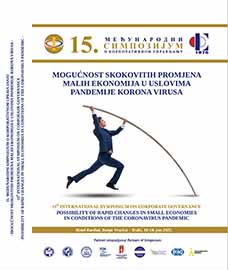PLES SA VIRUSOM: TEST OTPORNOSTI GLOBALNE EKONOMIJE
DANCING WITH THE VIRUS: A TEST OF RESILIENCE TO THE GLOBAL ECONOMY
Author(s): Polona DOMADENIK, Matjaž Koman, Tjaša Redek
Subject(s): Economy, National Economy, Business Economy / Management, Micro-Economics, Health and medicine and law, Public Finances, Human Resources in Economy, Socio-Economic Research
Published by: Finrar d.o.o Banja Luka
Keywords: pandemic;economic resilience; economic crisis; social crisis; uncertainty;
Summary/Abstract: The coronavirus pandemic represents a major shock for the global and EU economies and is expected to bear unpredictable, yet severe and long-lasting socio-economic consequences.Health crises provoked economic contagion and is now, it seems, spreading as fast as the disease itself. During the crisis, national economies found themselves in a free fall with different velocities. In general, it is expected that COVID-19 will take much higher toll in terms of GDP if compared with three main crises in past 100 years: the great depression in 1930s, first OPEC oil crises in the 1970s and the recent financial crises in the period of 2007-2009. Global GDP is projected to contract by about 4.4 percent in 2020, which is a sharper downturn than during the Global Financial Crisis in 2008-2009. It is then expected to rebound by 5.2percent in 2021, implying that global output should recover above it 2019 level but remain well below the level projected in the autumn 2019 forecast.The health and economic crisis has led to a significant job crisis that will increase the inequality and widen the gap in social structures. This paper presents the role of business and societal resilience. At the policy and societal level, the COVID-19 crisis has brought about a will to question the current functioning of economy and society with citizens’ initiatives. The economic system supporting the increasing share of precariat workers due to gig economy and deterioration of workers’ bargaining power, eroding the public institutions by austerity measures and siphoning value out of the economy by rewarding shareholders through stockbuyback schemes, rather than supporting investment in research and development, wages,and worker training, has proven to be ineffective to combat serious exogenous shocks. The current crisis calls for a new policy approach, based on theoretical foundations of (i) the developmental state, (ii) legal institutionalism and (iii) the entrepreneurial state.During the recent COVID crisis the switch in policy paradigm will improve the resilience of the companies in order to be capable of managing future disruptions and handling the most important challenges we need to solve like climate change, inequalities or financial crises, by reaping the synergies between collaboration, digitalization and sustainability.
Book: 15. MEĐUNARODNI SIMPOZIJUM O KORPORATIVNOM UPRAVLJANJU
- Page Range: 213-226
- Page Count: 14
- Publication Year: 2021
- Language: Serbian
- Content File-PDF

